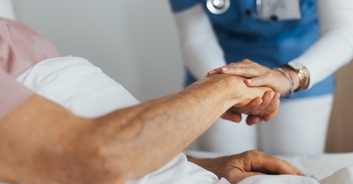Dieting is already super hard, now you're telling me there's thing out of my control that will make me larger than I want to be? Awesome. While some people can withstand the most delicious smelling snacks, others can’t possibly say no to a slice once they catch a sniff of pizza. That difference in willpower could be down to what’s going on up top. New research has found that your brain structure could impact your self-control when it comes to eating habits.
A study published in the journal JNeurosci analysed data from three previous experiments on the amount of grey matter in the brains of 91 people. The participants were placed in an MRI machine where they were instructed to "consider the healthiness" of a particular food, to "consider the taste" of a particular food or to "make decisions naturally".
They were then shown images of foods like yogurt or a cookie, and tasked with rating how much they wanted to eat it. The results showed that that those who thought more about the healthiness of an item or less about its tastiness had more grey matter in two areas of their prefrontal cortices – the dorsolateral prefrontal complex (which plays a role in cognitive skills like memory and attention) and the ventromedial prefrontal cortex (which influences emotional control and decision-making processes).
A second group of people were then put through a slightly different test. Different participants were placed in an MRI machine, but were told to "distance" themselves from the food, "indulge" in the food or "make decisions naturally” before being shown the images. They were then asked how much they would splash out on each item, from nothing to $2.50. Again, those with the most self-control had more grey matter.
This doesn't completely mean willpower is out of your hands. Researchers say that future studies should examine how the brain can be trained to resist unhealthy food. "(The) brain is plastic, so your brain structure changes over time," senior study author Hilke Plassmann told Live Science. "I don't want people to say, 'I'm just not good at self-control; I can't change it.'”
Someone who champions this idea well is the famous personal trainer Jillian Michaels. She promises the secret to looking and feeling your best doesn’t have to be overcomplicated. "Just work out, eat clean and don’t overeat. I promise you."
All it takes is a little maths (just a little I swear). If you want to lose weight, Jillian suggests doing 80 percent exercise and 20 percent diet. She says that you can't "starve the weight off", because that will shut down your metabolism down. Instead, she says you need to exercise it off by creating "an energy deficit".
When it comes to weight maintenance, Michaels says the formula is switched: for this you switch to 80 percent diet, 20 percent exercise. She says this because if you're not overeating, you won't gain weight. Michaels does, however, make the point that this doesn't necessarily mean you'll be healthy or in good shape.
"I know people that never overeat... Their body fat percentage might be higher, they might not have a ton of lean muscle, and they might not necessarily be healthy, but they won't gain weight," she says. While it's not entirely in black and white, the basis of this theory is excellent to build on.





.jpg_klhOkr?tr=h-40&config=JTdCJTIybmFtZSUyMiUzQSUyMm51cnNpbmclMjBob21lJTIwKDEpLmpwZyUyMiUyQyUyMmRlc2NyaXB0aW9uJTIyJTNBJTIyRmVhdHVyZWQlMjBpbWFnZSUyMGNyZWRpdCUzQSUyME1BU1RFUiUyMCUyRiUyMEdldHR5JTIyJTJDJTIyYWx0ZXJuYXRpdmVfdGV4dCUyMiUzQSUyMm51cnNpbmclMjBob21lJTIwKDEpLmpwZyUyMiUyQyUyMmNhcHRpb24lMjIlM0ElMjJGZWF0dXJlZCUyMGltYWdlJTIwY3JlZGl0JTNBJTIwTUFTVEVSJTIwJTJGJTIwR2V0dHklMjIlMkMlMjJjb29yZGluYXRlcyUyMiUzQSU3QiUyMmRlc2t0b3AlMjIlM0ElN0IlMjJsZWZ0JTIyJTNBMCUyQyUyMnRvcCUyMiUzQTAlMkMlMjJyaWdodCUyMiUzQTElMkMlMjJib3R0b20lMjIlM0EwLjUyJTdEJTJDJTIydGFibGV0JTIyJTNBJTdCJTIybGVmdCUyMiUzQW51bGwlMkMlMjJ0b3AlMjIlM0FudWxsJTJDJTIycmlnaHQlMjIlM0FudWxsJTJDJTIyYm90dG9tJTIyJTNBbnVsbCU3RCUyQyUyMm1vYmlsZSUyMiUzQSU3QiUyMmxlZnQlMjIlM0FudWxsJTJDJTIydG9wJTIyJTNBbnVsbCUyQyUyMnJpZ2h0JTIyJTNBbnVsbCUyQyUyMmJvdHRvbSUyMiUzQW51bGwlN0QlN0QlMkMlMjJ3aWR0aCUyMiUzQTE1MzUlMkMlMjJoZWlnaHQlMjIlM0E4MDAlMkMlMjJ1dWlkJTIyJTNBJTIyOGFkN2ZlYjMtYzNiMC00YzI2LTkzMTgtY2ZmYzBhY2IwNTYxX193cC1jb250ZW50JTJGdXBsb2FkcyUyRm51cnNpbmdob21lKDEpLmpwZ19rbGhPa3IlMjIlN0Q=)





.jpg_klhOkr?tr=h-184&config=JTdCJTIybmFtZSUyMiUzQSUyMm51cnNpbmclMjBob21lJTIwKDEpLmpwZyUyMiUyQyUyMmRlc2NyaXB0aW9uJTIyJTNBJTIyRmVhdHVyZWQlMjBpbWFnZSUyMGNyZWRpdCUzQSUyME1BU1RFUiUyMCUyRiUyMEdldHR5JTIyJTJDJTIyYWx0ZXJuYXRpdmVfdGV4dCUyMiUzQSUyMm51cnNpbmclMjBob21lJTIwKDEpLmpwZyUyMiUyQyUyMmNhcHRpb24lMjIlM0ElMjJGZWF0dXJlZCUyMGltYWdlJTIwY3JlZGl0JTNBJTIwTUFTVEVSJTIwJTJGJTIwR2V0dHklMjIlMkMlMjJjb29yZGluYXRlcyUyMiUzQSU3QiUyMmRlc2t0b3AlMjIlM0ElN0IlMjJsZWZ0JTIyJTNBMCUyQyUyMnRvcCUyMiUzQTAlMkMlMjJyaWdodCUyMiUzQTElMkMlMjJib3R0b20lMjIlM0EwLjUyJTdEJTJDJTIydGFibGV0JTIyJTNBJTdCJTIybGVmdCUyMiUzQW51bGwlMkMlMjJ0b3AlMjIlM0FudWxsJTJDJTIycmlnaHQlMjIlM0FudWxsJTJDJTIyYm90dG9tJTIyJTNBbnVsbCU3RCUyQyUyMm1vYmlsZSUyMiUzQSU3QiUyMmxlZnQlMjIlM0FudWxsJTJDJTIydG9wJTIyJTNBbnVsbCUyQyUyMnJpZ2h0JTIyJTNBbnVsbCUyQyUyMmJvdHRvbSUyMiUzQW51bGwlN0QlN0QlMkMlMjJ3aWR0aCUyMiUzQTE1MzUlMkMlMjJoZWlnaHQlMjIlM0E4MDAlMkMlMjJ1dWlkJTIyJTNBJTIyOGFkN2ZlYjMtYzNiMC00YzI2LTkzMTgtY2ZmYzBhY2IwNTYxX193cC1jb250ZW50JTJGdXBsb2FkcyUyRm51cnNpbmdob21lKDEpLmpwZ19rbGhPa3IlMjIlN0Q=)
